Squarespace vs Adobe Portfolio: Final verdict
Squarespace and Adobe Portfolio cater to different user needs, with Squarespace being a more versatile website builder and Adobe Portfolio focusing on showcasing creative work.
-
Squarespace (Overall Grade: 7.9/10)
is a powerful and user-friendly website builder that offers a wide range of templates and advanced design features. It excels in ecommerce capabilities, making it a great choice for businesses looking to set up an online store. Squarespace also provides robust marketing tools, comprehensive customer support, and strong security features. When comparing Squarespace vs Adobe Portfolio, Squarespace stands out for its versatility and ease of use, making it suitable for a broad audience. -
Adobe Portfolio (Overall Grade: 5.5/10)
is designed specifically for creative professionals who want to showcase their work. It offers a user-friendly interface, seamless integration with Adobe Creative Cloud, and a selection of customizable templates tailored for creatives. However, it lacks ecommerce capabilities and some advanced features found in other website builders. In the Squarespace vs Adobe Portfolio comparison, Adobe Portfolio is ideal for photographers, graphic designers, and artists who need a simple yet effective platform to display their portfolios.

|

|
|
|---|---|---|
|
Design functionalities & templates |
8.0 |
7.4 |
|
Ease of use |
8.3 |
8.7 |
|
Ecommerce |
8.2 |
0.0 |
|
Website Editors |
8.3 |
7.4 |
|
Product testing options |
7.4 |
7.6 |
|
Price |
8.4 |
7.7 |
|
Hosting quality |
7.6 |
7.0 |
|
Website speed optimization |
6.7 |
6.2 |
|
Plugins and integrations |
6.8 |
6.7 |
|
Marketing features |
8.1 |
3.7 |
|
Customer support |
7.8 |
7.3 |
|
Security |
8.8 |
8.1 |
|
AI capabilities |
7.5 |
0.0 |
|
User Management |
7.4 |
3.0 |
Which one is the best for ecommerce: Squarespace or Adobe Portfolio?
 8.2
8.2
 0.0
0.0
Verdict
: Squarespace is the clear winner for ecommerce, offering a comprehensive suite of tools and features, while Adobe Portfolio lacks ecommerce capabilities entirely.
-
Squarespace
: Squarespace is a user-friendly ecommerce solution for businesses, simplifying online store setup with an intuitive interface and customizable templates. It streamlines product management, ensuring a visually appealing and responsive store on various devices. The platform handles secure payment processing, flexible shipping options, and automated tax calculations, while also providing built-in marketing tools, SEO optimization, and detailed analytics for enhanced store visibility and performance. Squarespace scores 8.2 for ecommerce. -
Adobe Portfolio
: Adobe Portfolio is designed for creative professionals to showcase their work and does not offer any ecommerce features. It is ideal for photographers, graphic designers, artists, and other creatives looking to build a professional online presence but is not suitable for those looking to sell products online. Adobe Portfolio scores 0.0 for ecommerce.
Which one is the best for informational and business websites?
 8.4
8.4
 7.4
7.4
Verdict
: Squarespace is the superior choice for creating informational and business websites, offering a broader range of templates and more advanced design features compared to Adobe Portfolio.
-
Squarespace
: Squarespace excels in providing a versatile platform with a wide variety of templates and advanced design functionalities. It is user-friendly and offers a comprehensive set of features that cater to different types of websites, making it ideal for business and informational sites. With a score of 8.4, Squarespace stands out for its ease of use, robust website editor, and superior hosting quality. -
Adobe Portfolio
: Adobe Portfolio is tailored for creative professionals looking to showcase their work. While it offers a user-friendly interface and seamless integration with Adobe Creative Cloud, it lacks the advanced features and versatility of Squarespace. Scoring 7.4, Adobe Portfolio is best suited for photographers, graphic designers, and artists who need a simple yet effective platform to display their portfolios. When comparing Squarespace vs Adobe Portfolio, Adobe Portfolio is more limited in scope but excels in its niche.
Squarespace vs Adobe Portfolio: Detailed comparison
Design functionalities & templates
Design FunctionalitiesRepresents how well each platform allows for creative design and customization of websites.Score Components:
- Template Variety (30%): Range and quality of design templates.
- Customization (30%): Flexibility and options for design alterations.
- User Interface (20%): Ease and intuitiveness of the design process.
- Responsiveness (10%): Adaptability to different devices and screen sizes.
- Innovation (10%): Unique design features and tools.
 8.0
8.0
 7.4
7.4
🏆
Winner: Squarespace.
Squarespace offers a wider variety of templates and more advanced design features, making it a more versatile choice for different types of websites.
Squarespace boasts an impressive variety of website templates, offering over 120 pre-designed options to choose from. These templates cater to a wide range of needs and industries, from creative portfolios and sleek online stores to professional business websites and personal blogs.
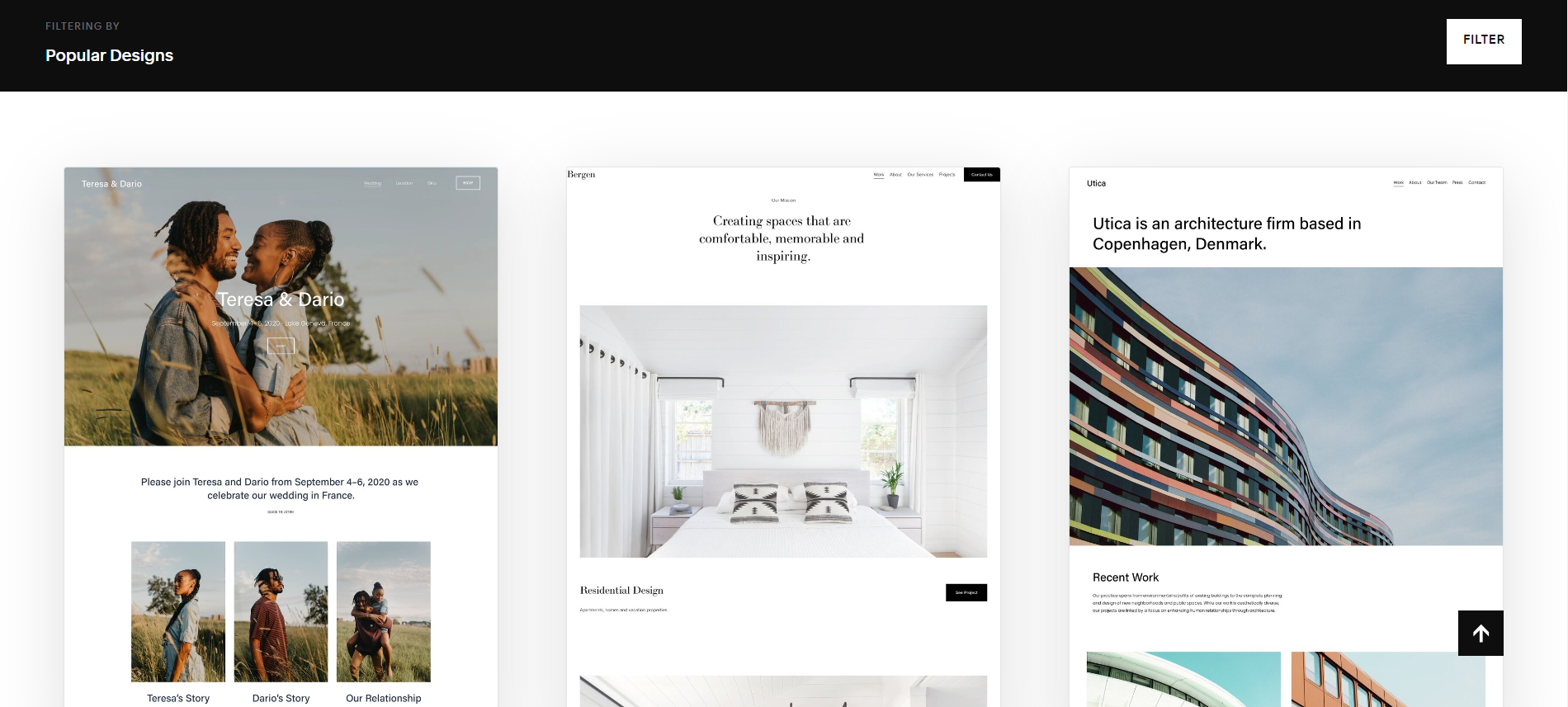

On the other hand, Adobe Portfolio offers a selection of customizable templates designed for creatives across various fields, such as photography, graphic design, and web design. These templates are responsive and tailored to showcase creative work effectively across all devices.
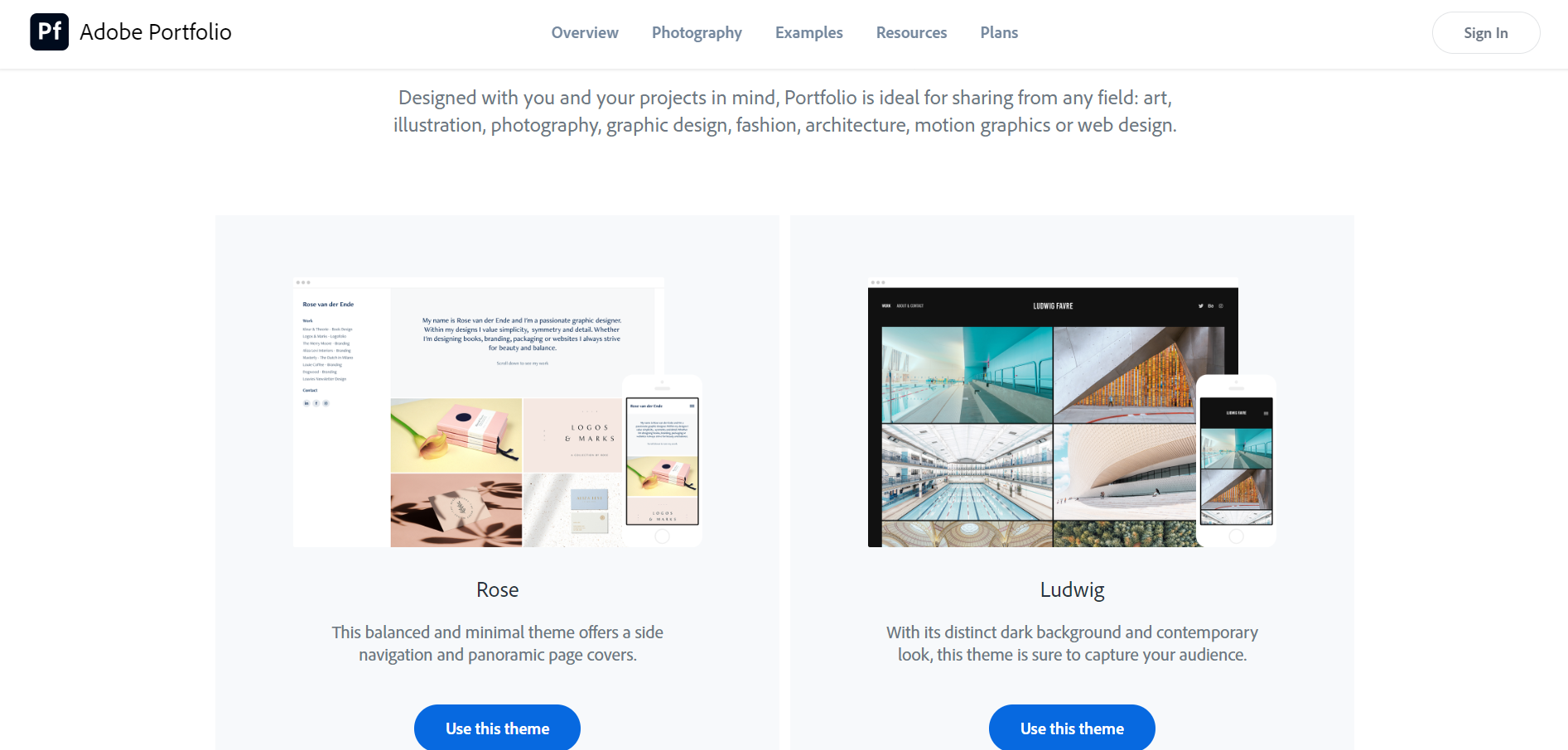
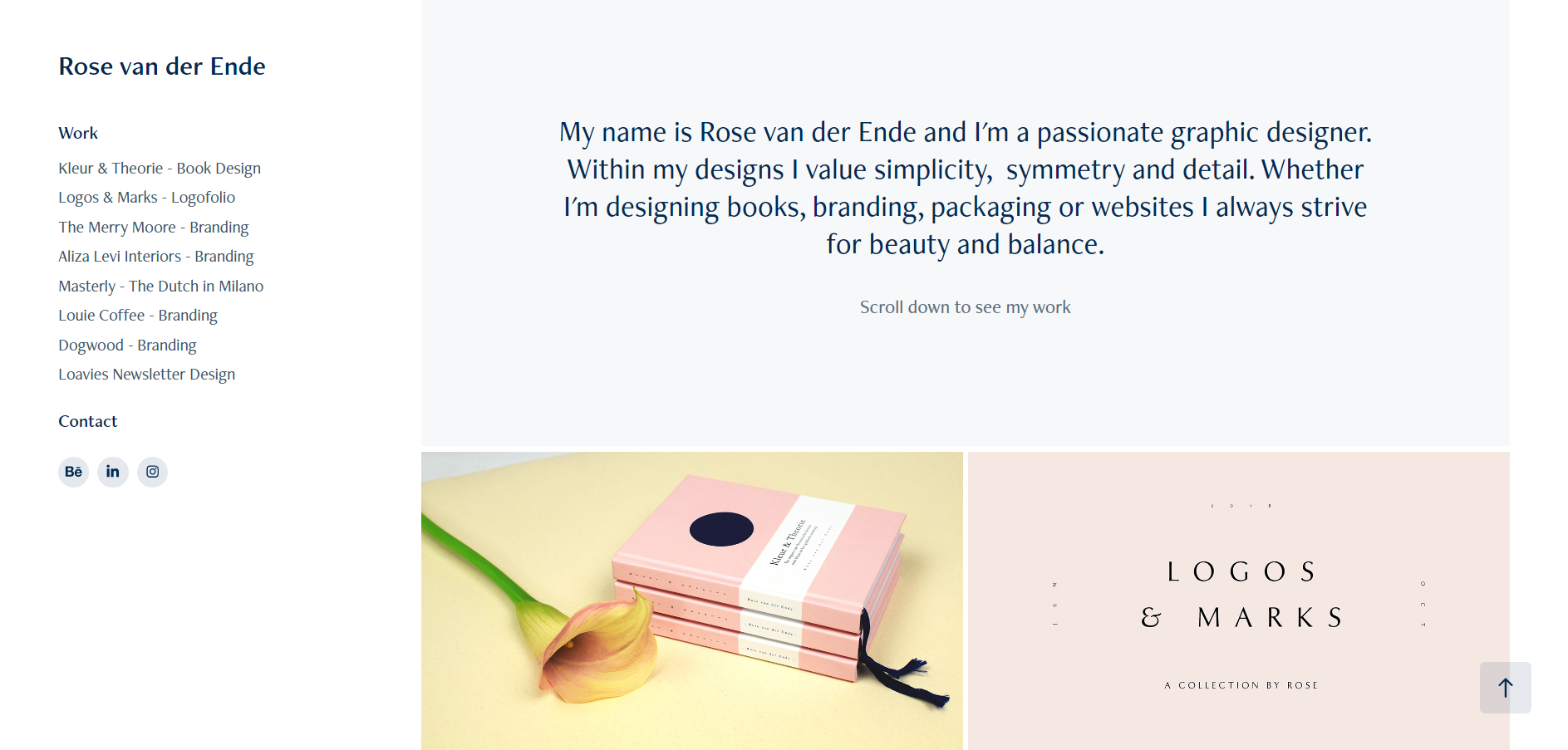
Get a head start on website creation with AI
Create a custom website tailored to your business needs 10X faster with 10Web AI Website Builder!
Ease of use
Ease of useReflects the platform’s overall user-friendliness.Score
Components:
- Learning curve (40%): Quickness and ease of getting started.
- Interface design (30%): Simplicity and intuitiveness of layout.
- User guidance (20%): Quality of tutorials and support.
- Flexibility (10%): Adaptability to various user skills.
 8.3
8.3
 8.7
8.7
🏆 Winner: Adobe Portfolio
. With a score of 8.7, Adobe Portfolio edges out Squarespace (8.3) in terms of ease of use. Adobe Portfolio is designed with a user-friendly interface that caters to creatives, offering a range of customizable templates and seamless integration with Adobe Creative Cloud. Squarespace, while also user-friendly, has some limitations in customization, especially in template design.
Learning Resources
🏆 Winner: Tie
. Both Squarespace and Adobe Portfolio offer extensive learning resources for their users. Squarespace provides a comprehensive Help Center, video tutorials, live webinars, an informative blog, and an active community forum. Adobe Portfolio’s Official Help Center provides detailed tutorials and articles, interactive guides, and tutorials.
For ecommerce
EcommerceMeasures the platform’s effectiveness in supporting online business activities.Score Components:
- Ecommerce themes and templates (20%): Variety and design of templates.
- Product management (25%): Ease of managing and organizing products.
- Payment options (25%): Variety and convenience of payment methods.
- Ecommerce features (20%): Features for managing an ecommerce store.
- Integration (10%): Compatibility with external e-commerce tools and services.
 8.2
8.2
 0.0
0.0
Squarespace is a user-friendly ecommerce solution for businesses, simplifying online store setup with an intuitive interface and customizable templates. It streamlines product management, ensuring a visually appealing and responsive store on various devices. The platform handles secure payment processing, flexible shipping options, and automated tax calculations, while also providing built-in marketing tools, SEO optimization, and detailed analytics for enhanced store visibility and performance.
On the other hand, Adobe Portfolio does not have ecommerce capabilities. It is a website builder specifically designed for creative professionals to showcase their work, but it does not offer features for selling products online.

|

|
|
|---|---|---|
|
Ecommerce themes and templates |
7.5 |
0.0 |
|
Product page customization |
7.0 |
0.0 |
|
Payment processing and commissions |
7.8 |
0.0 |
|
POS capabilities |
6.5 |
0.0 |
|
Payment gateways |
7.5 |
0.0 |
|
Product numbers |
6.8 |
0.0 |
|
Additional ecommerce features |
7.2 |
0.0 |
Squarespace ecommerce features:
- Intuitive interface
- Secure payment processing
- Built-in marketing tools
- SEO optimization
- Website analytics
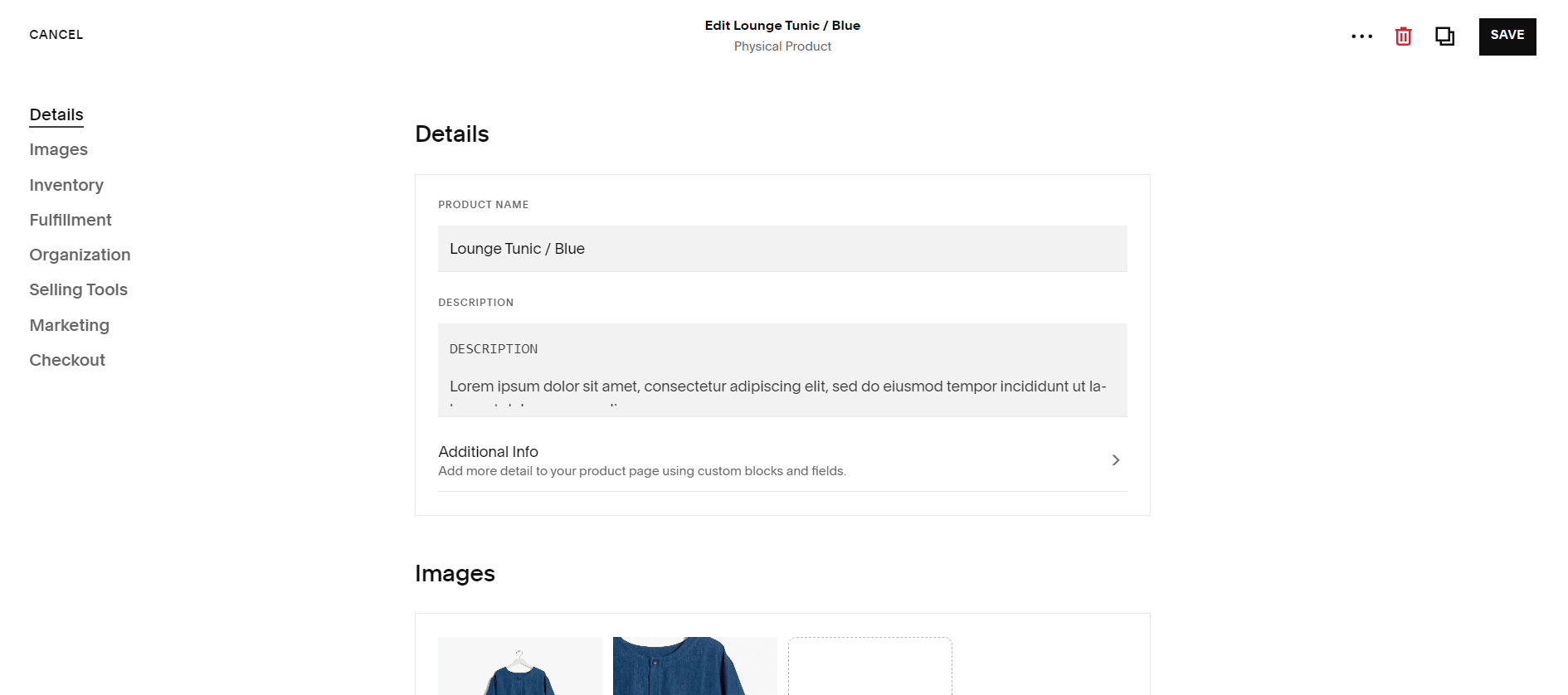
Adobe Portfolio ecommerce features:
Adobe Portfolio does not have any ecommerce features.
Ecommerce themes & templates
Squarespace provides a diverse selection of around 50 ecommerce templates, catering to various industries like fashion, beauty, home goods, and technology. These templates range from clean and minimalist to bold and colorful, accommodating different brand aesthetics and product types. Offering unique layout elements such as product sliders and featured collections, these templates enhance visual interest and engagement.
Adobe Portfolio does not have any ecommerce specific templates.
Product page customization
Customizing Squarespace product pages offers options for layout, design, and interactive elements. Choose templates, customize colors, fonts, and content. Enhance engagement with features like customizable buttons, wishlists, comparisons, reviews, and related products. Advanced options include custom code injection and third-party app integrations. Limitations include fixed core page structure and the need for technical expertise. Free templates have fewer customization options than premium ones.
Adobe Portfolio does not have product page customization features.
Payment processing
Squarespace provides flexible payment processing for online stores with integrated gateways like Stripe and PayPal. External gateways can be set up for specific needs. Transaction fees may apply depending on the plan and payment method. Security measures include PCI compliance and fraud prevention. Additional features include payment links, support for subscriptions, and the ability to accept international payments in various currencies.
Adobe Portfolio does not have any payment processing capabilities.
Website Editors
Website EditorsEvaluates the platforms’ website building and editing capabilities.Score Components:
- Customization tools (40%): Range and power of editing features.
- Editor usability (30%): User experience within the editor.
- Design flexibility (20%): Freedom in layout and design changes.
- Update and maintenance ease (10%): Simplicity of updating and maintaining the site.
 8.3
8.3
 7.4
7.4
🏆
Winner: Squarespace
. Squarespace, with a score of 8.3, offers a user-friendly editor that allows easy drag-and-drop website creation without coding. With visually appealing templates and customization options, it caters to beginners and pros alike. The real-time editing experience ensures instant previews. Prioritizing content, it’s mobile-responsive and offers functional features like forms, social media integration, and online stores. Squarespace seamlessly integrates with tools for extended capabilities.
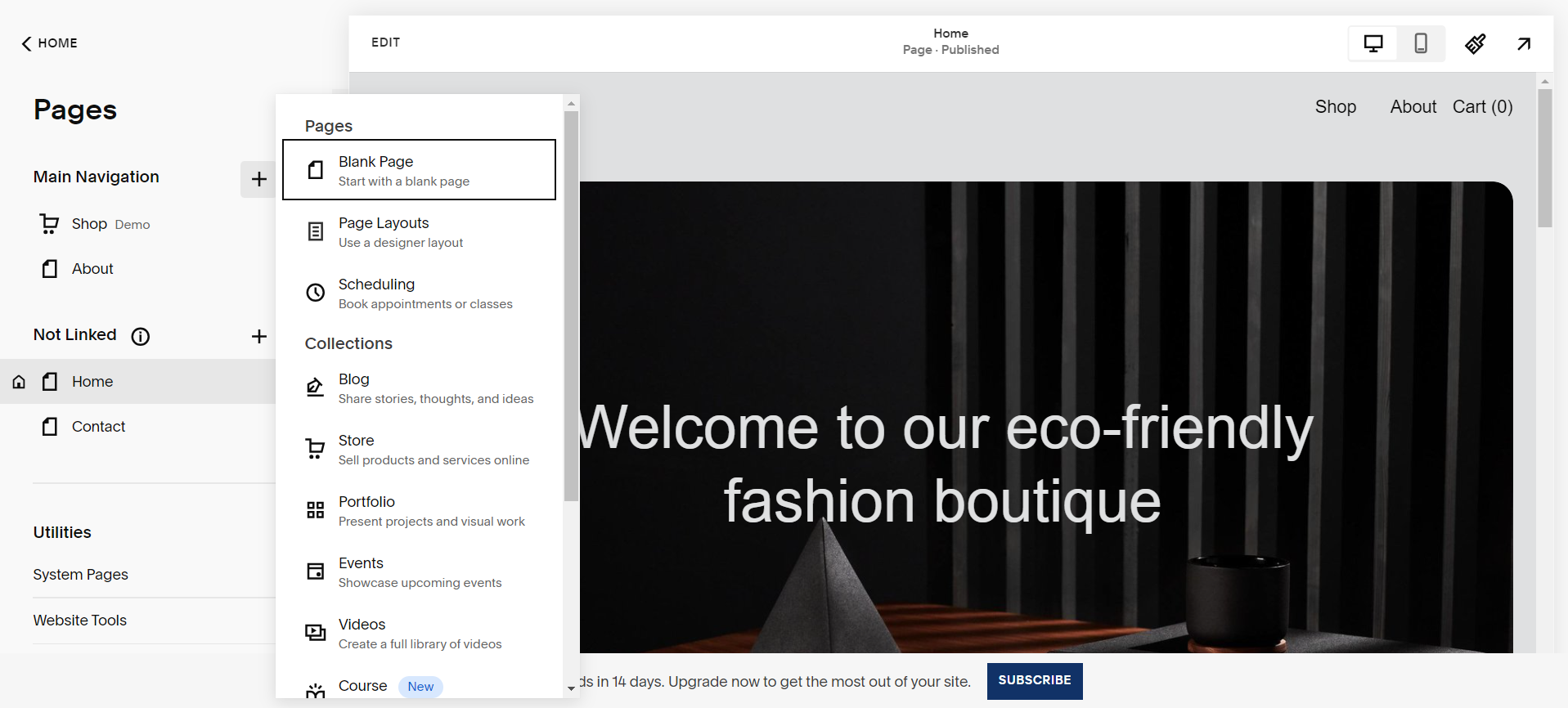
Adobe Portfolio’s editor, scoring 7.4, is designed for creatives to showcase their work. With it, users can easily create and customize their own professional-looking websites without needing to code. The editor allows for the integration of high-quality images and videos, offers a variety of responsive templates tailored to different creative fields, and provides seamless Adobe Creative Cloud integration, enabling users to directly import their work. However, it lacks advanced e-commerce features and requires an Adobe Creative Cloud subscription for access.
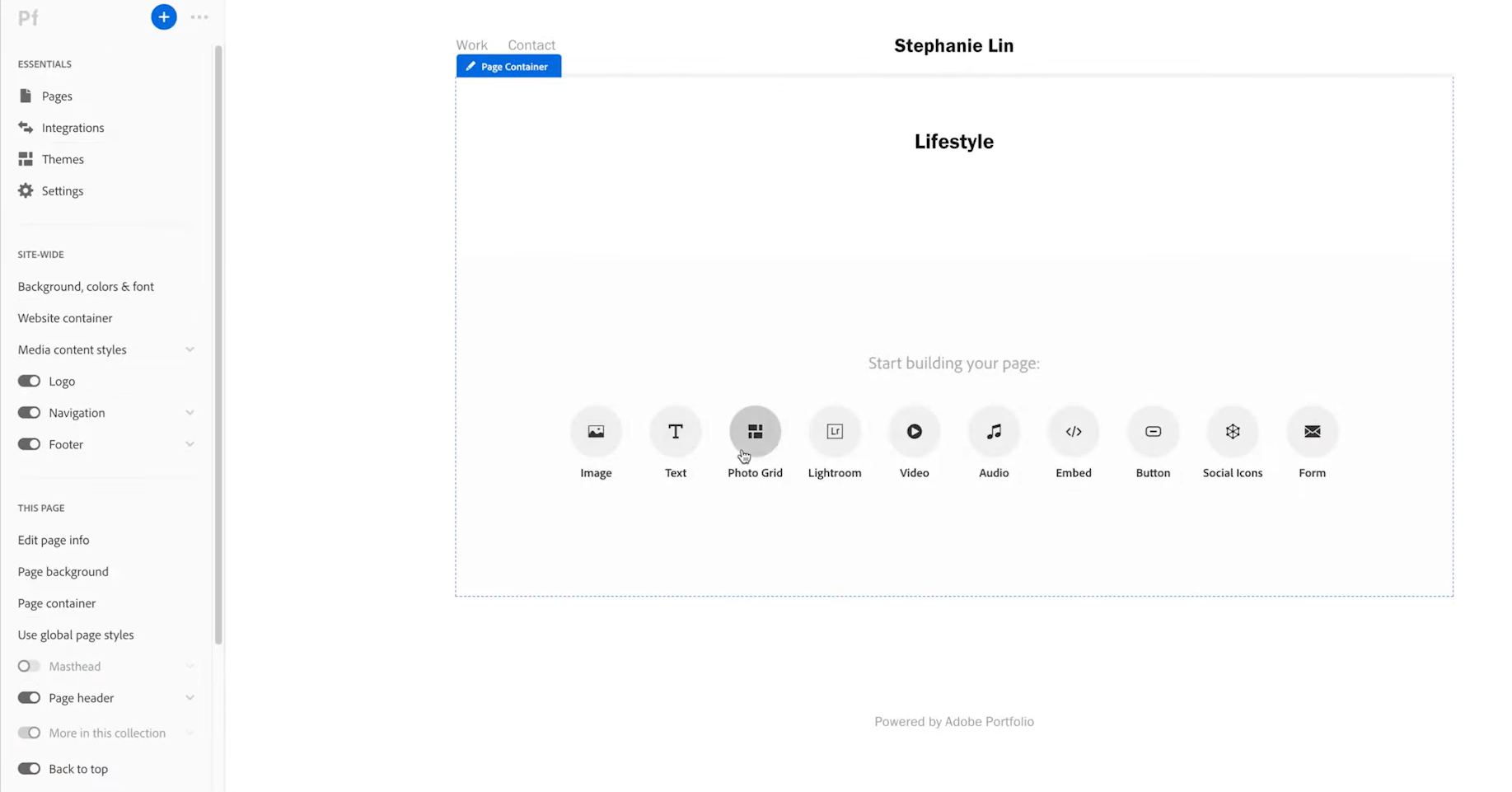
Mobile editor/app
 8.5
8.5
 0
0
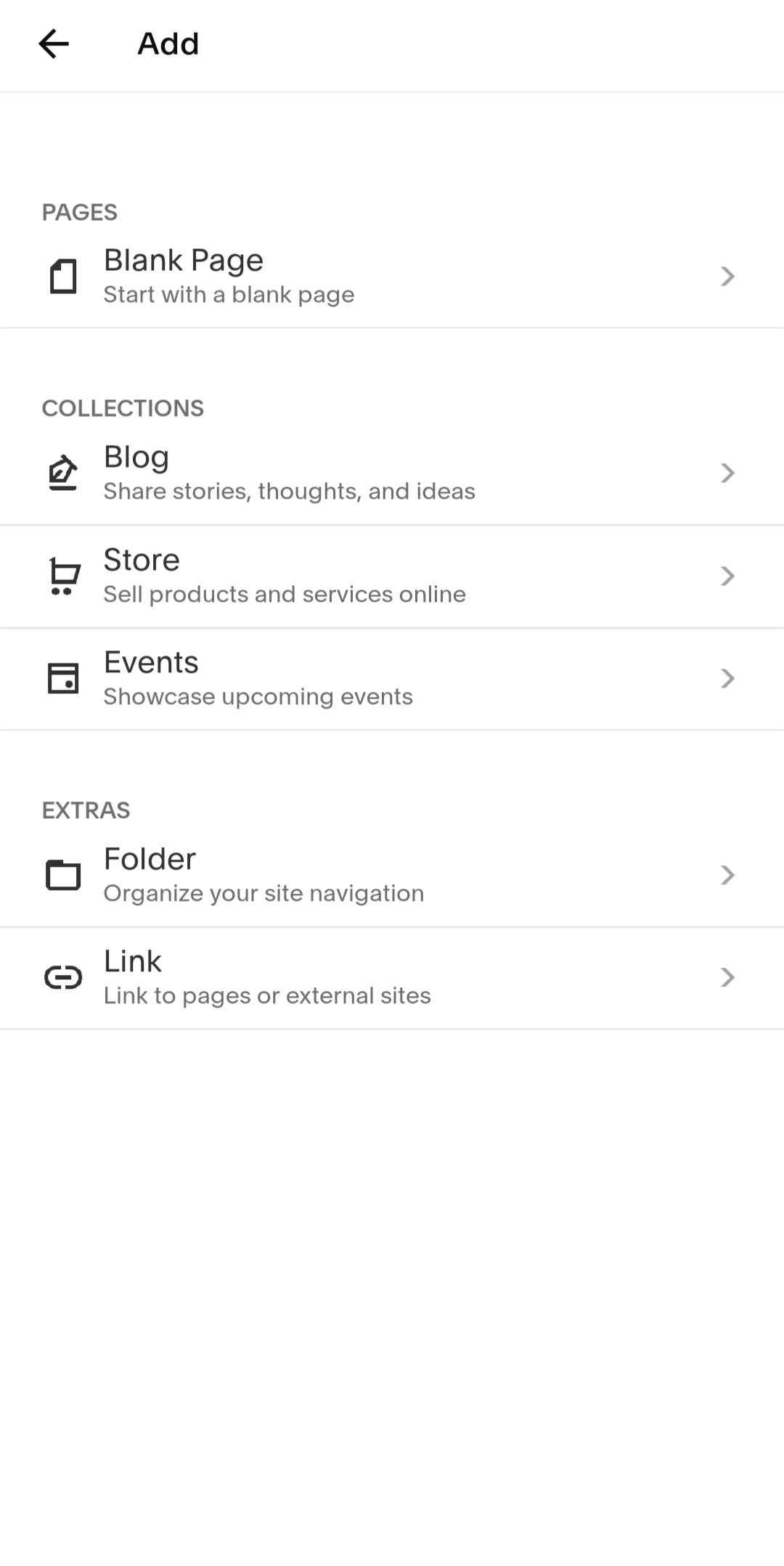
🏆
Winner: Squarespace
. Squarespace offers a mobile app that allows users to manage their website, edit content, view analytics, manage their online store, and schedule social media posts. However, it does not offer the full range of functionalities available on the desktop version.
On the other hand, Adobe Portfolio does not have a mobile editor app. Therefore, Squarespace is the clear winner in this category.
Product testing options
Product Testing OptionsAssesses the options for trying out platform features before commitment.Score Components:
- Trial quality (40%): Extent and usefulness of the trial or free version.
- Feature accessibility (30%): How many features are available to test.
- Trial duration (20%): Length of the trial period.
- Ease of transition (10%): Smoothness of moving from trial to paid plans.
 7.4
7.4
 7.6
7.6
Overall Result
:
Adobe Portfolio Wins
. Adobe Portfolio scores slightly higher than Squarespace with a score of 7.6 against 7.4. Adobe Portfolio offers a trial version that allows users to explore all features and even create a portfolio website. However, users cannot publish their website without subscribing to a plan. On the other hand, Squarespace offers a 14-day free trial with most of the premium features available for testing, except for custom code, premium integrations, and removal of Squarespace branding.

|

|
|
|---|---|---|
|
Free Plan |
No | No |
|
Trial Duration |
14 days |
Yes |
|
Testing Premium Features |
Most features, except for custom code, premium integrations and removal of Squarespace branding |
All features, but cannot publish without a plan |
|
Money Back Guarantee |
Full refund within 14 days | 14-day money back guarantee |
Price
PriceLooks at the cost-effectiveness and value for money of each platform.Score Components:
- Plan value (40%): What each pricing tier offers.
- Transparency and clarity (30%): Clearness of pricing structures.
- Flexibility of plans (20%): Range of options to suit different budgets.
- Hidden costs (10%): Additional expenses not included in the plan.
 8.4
8.4
 7.7
7.7
Squarespace offers a range of plans suitable for different needs, from personal to high-volume online stores, while Adobe Portfolio’s pricing is tied to the Creative Cloud subscription, making it a good choice for creatives who already use Adobe’s suite of tools.

|

|
|
|---|---|---|
|
$5-$15 |
Personal ($12/month): Build a basic website with limited features for personal use. Access to basic templates, mobile-friendly design, and some social media integrations. Value for price: 6.0 |
Creative Cloud – Photography ($9.99/month): Up to 5 Portfolio sites with fonts from Adobe Fonts, and with access to Photoshop and Lightroom and 20GB storage. Value for price: 7.0 |
|
$15-$20 |
Business ($16/month): Upgrade features with custom domain, SEO tools, marketing tools like email campaigns, and analytics. Value for price: 7.5 |
No offering at this amount. |
|
$20-$30 |
Commerce ($26/month): Perfect for online stores with built-in eCommerce functionality (unlimited products), secure checkout, inventory management, and marketing tools. Value for price: 8.5 |
No offering at this amount. |
|
$40+ |
Advanced Commerce ($40/month): Cater to high-volume stores with advanced eCommerce features like abandoned cart recovery, product subscriptions, gift cards, and real-time shipping quotes. Value for Price: 9.0 |
Creative Cloud – All Apps ($59.99/month): Up to 5 Portfolio sites with the entire collection of Adobe creative apps, including Photoshop, Illustrator and InDesign, with 20 GB storage. Value for Price: 8.5 |
location. As a result in rare cases the prices displayed here can differ from the ones you see on their
websites.
Hosting quality
Hosting
qualityExamines the reliability and performance of the hosting solutions.Score Components:
- Uptime (40%): Consistency and reliability of website availability.
- Speed (30%): Loading times and performance.
- Bandwidth and storage (20%): Sufficiency of resources provided.
- Data centers (10%): Quality and distribution of hosting infrastructure.
 7.6
7.6
 7.0
7.0
🏆
Winner: Squarespace
Squarespace offers proprietary cloud-based hosting with a 99.9% uptime guarantee and data centers across North America, Europe, and Asia. Adobe Portfolio also provides cloud hosting but does not specify its uptime or offer an uptime guarantee. Its data centers are located in the US, Ireland, and Japan. Despite Adobe Portfolio’s strong offering, Squarespace’s transparency and uptime guarantee give it the edge in this category.

|

|
|
|---|---|---|
|
Do they offer hosting? |
Yes, included in all paid plans |
Yes, included in all paid plans, free plan with limited features |
|
Data Centers: |
Squarespace’s data centers are strategically scattered across North America, Europe, and Asia |
3 globally: US, Ireland and Japan |
|
Type of hosting: |
Proprietary cloud-based hosting |
Cloud Hosting |
|
Uptime: |
99.9% |
Adobe Portfolio does not publish its uptime statistics |
|
Uptime Guarantee: |
Yes |
No |
Website Speed Optimization
Website Speed OptimizationEvaluates optimization of website loading timesScore Components:
- PageSpeed Score (30%): Google’s score indicating performance optimization.
- Loading Time (30%): The average time until a website is fully interactive.
- Mobile Optimization (15%): Optimization effectiveness for mobile devices.
- Resource Optimization (15%): Optimizing images, scripts, and other heavy resources.
- CDN Usage (10%): Use of CDN to enhance speed across geolocations.
 6.7
6.7
 6.2
6.2
🏆 Winner: Squarespace
Both Squarespace and Adobe Portfolio have strategies in place for website speed optimization, but Squarespace has a higher Website Speed Optimization score and provides more detailed information about its strategies and improvements.

|

|
|
|---|---|---|
|
Focus |
Responsive design, image optimization |
Image optimization, SEO |
|
Performance Tools |
CDN, code minification, lazy loading |
Meta Tag Configurations |
|
Key Strategies |
Responsive design, image optimization, CDN, code minification, lazy loading of images |
Image optimization, SEO and Meta Tag Configurations |
|
Load Times |
0.7s to 9.1 s (Average: 2.9s) |
Varies depending on design choices and content volume |
|
Page Speed Scores Range |
20/100 to 93/100 (Average: 62.7/100) |
Not disclosed |
|
Core Web Vitals Improvement |
Emphasis on LCP, FID, CLS improvements |
Not disclosed |
Squarespace’s approach to website speed optimization includes responsive design, image optimization, use of a content delivery network (CDN), code minification, and lazy loading of images. These strategies help to improve load times and PageSpeed scores, which range from 20/100 to 93/100, with an average of 62.7/100. Load times range from 0.7s to 9.1s, with an average of 2.9s. Squarespace also places emphasis on improving Core Web Vitals, specifically LCP, FID, and CLS.
Adobe Portfolio’s strategies for website speed optimization include image optimization and SEO and Meta Tag Configurations. However, Adobe Portfolio does not provide specific information about its load times, PageSpeed scores, or Core Web Vital improvements. The load times and PageSpeed scores are said to vary depending on specific design choices and content volume.
Get a head start on website creation with AI
Create a custom website tailored to your business needs 10X faster with 10Web AI Website Builder!
Plugins and integrations
Plugins and integrationsMeasures the range and effectiveness of additional plugins and integrations.Score Components:
- Variety of options (40%): Range of available add-ons.
- Integration smoothness (30%): Ease of integrating plugins into the site.
- Quality of plugins (20%): Functionality and reliability of the options.
- Custom integration capabilities (10%): Support for custom or third-party integrations.
 6.8
6.8
 6.7
6.7
🏆 Winner: Squarespace.
With a score of 6.8, Squarespace edges out Adobe Portfolio (6.7) in terms of plugins and integrations. Squarespace offers a diverse range of third-party plugins and official partner integrations, enhancing functionalities across analytics, marketing, commerce, and social media. Adobe Portfolio, on the other hand, focuses on integrations with Adobe services, making it a great choice for creatives who are already using Adobe Creative Cloud. However, Squarespace’s broader range of integrations makes it a more versatile choice for a wider range of website needs.
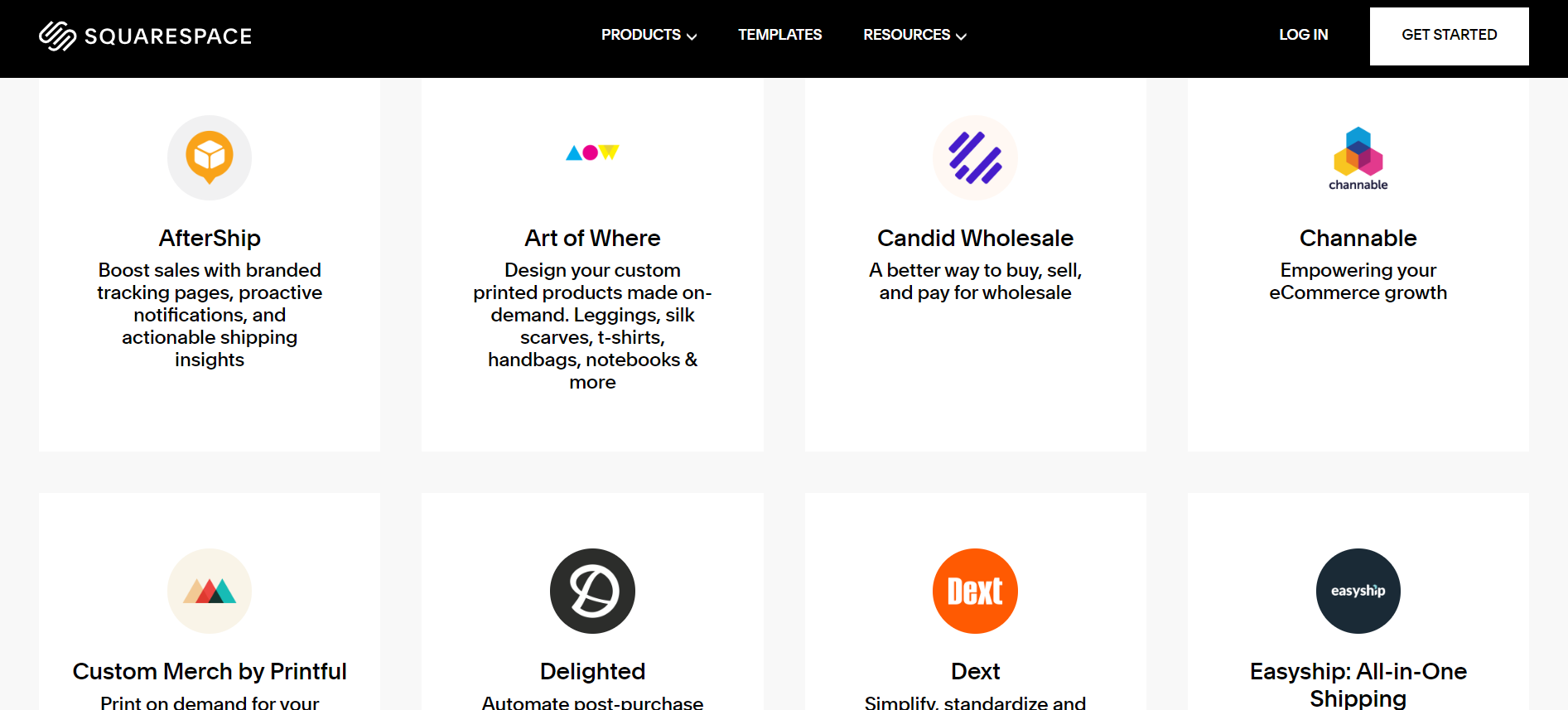
Marketing Features
Design FunctionalitiesRepresents how well each platform allows for creative design and customization of websites.Score Components:
- Template Variety (30%): Range and quality of design templates.
- Customization (30%): Flexibility and options for design alterations.
- User Interface (20%): Ease and intuitiveness of the design process.
- Responsiveness (10%): Adaptability to different devices and screen sizes.
- Innovation (10%): Unique design features and tools.
 8.1
8.1
 3.7
3.7
🏆
Overall Winner: Squarespace
. Squarespace offers a comprehensive suite of marketing tools, including SEO, email marketing, blogging, social media integration, analytics and reporting, and ads and promotions. Adobe Portfolio, while offering basic SEO and social media integration, lacks in email marketing, blogging, and ads and promotions.

|

|
|
|---|---|---|
|
SEO Tools |
|
|
|
Email Marketing |
|
|
|
Blogging |
|
|
|
Social Media Integration |
Direct linking and selling on social platforms, plus feed displays on-site |
Limited integration |
|
Analytics and Reporting |
Detailed insights into website performance and visitor behavior |
Users can use Google Analytics |
|
Ads and Promotions |
Integration with Google Ads and tools for managing sophisticated ad campaigns |
|
Customer Support
Customer supportEvaluates the quality and availability of support options.Score Components:
- Response time (40%): Speed of support responses.
- Support quality (30%): Effectiveness and helpfulness of the support.
- Availability (20%): Range of support channels (phone, chat, email).
- Resource richness (10%): Quality of self-help and educational materials.
 7.8
7.8
 7.3
7.3
🏆 Winner: Squarespace
. Comparing Squarespace vs Adobe Portfolio, Squarespace takes the lead with its diverse support options, including live chat, email, and a community forum. Squarespace’s live chat and phone support are available on weekdays, while email support is accessible 24/7. The comprehensive help center and community forum provide users with extensive resources to resolve issues independently.
Adobe Portfolio, on the other hand, offers a range of self-service support options, including a detailed Knowledgebase and FAQ section. While Adobe provides live chat and phone support, the emphasis is more on self-service help. This makes Squarespace a more robust option for users seeking immediate and varied support channels.
Security
SecurityLooks at the platforms’ security measures and data protection.Score Components:
- Data protection (40%): Safeguards for user and customer data.
- SSL and encryption (30%): Implementation of secure connections.
- Compliance (20%): Adherence to industry security standards.
- Regular updates (10%): Frequency of security updates and patches.
 8.8
8.8
 8.1
8.1
🏆
Winner: Squarespace
. Squarespace takes a comprehensive approach to security, with features such as secure server storage, encryption, strict access controls, compliance with regulations such as GDPR and CCPA, transparent privacy policies, and additional security measures like vulnerability scanning and malware detection. These measures collectively safeguard your website content and customer information.
Adobe Portfolio also prioritizes the security and privacy of user and customer data, implementing comprehensive data protection measures aligned with major regulatory frameworks. However, it offers basic security measures for websites, such as SSL certificates and password protection, which may not be as comprehensive as Squarespace’s security features.
AI Capabilities
AI capabilitiesMeasures the effectiveness of AI-driven features and tools.Score Components:
- Automation efficiency (40%): Impact of AI on streamlining processes.
- Personalization (30%): AI-driven customization for users or customers.
- AI-Assisted design (20%): Role of AI in website design and functionality.
- Data analysis (10%): Use of AI in interpreting user data and analytics.
 7.5
7.5
 0
0

|

|
|
|---|---|---|
|
AI Builder |
Not fully automated, but offers AI-powered features |
|
|
AI Ecommerce features |
AI-powered copywriting, SEO optimization, product suggestions |
|
|
AI content generation |
Generates diverse content including product descriptions |
|
|
Additional AI features |
SEO optimization, email marketing insights, content suggestions |
|
🏆 Winner: Squarespace
. Squarespace, with a score of 7.5, offers a range of AI-powered features that assist in website creation, eCommerce, and content generation. These features include AI-powered copywriting, SEO optimization, product suggestions, and more.
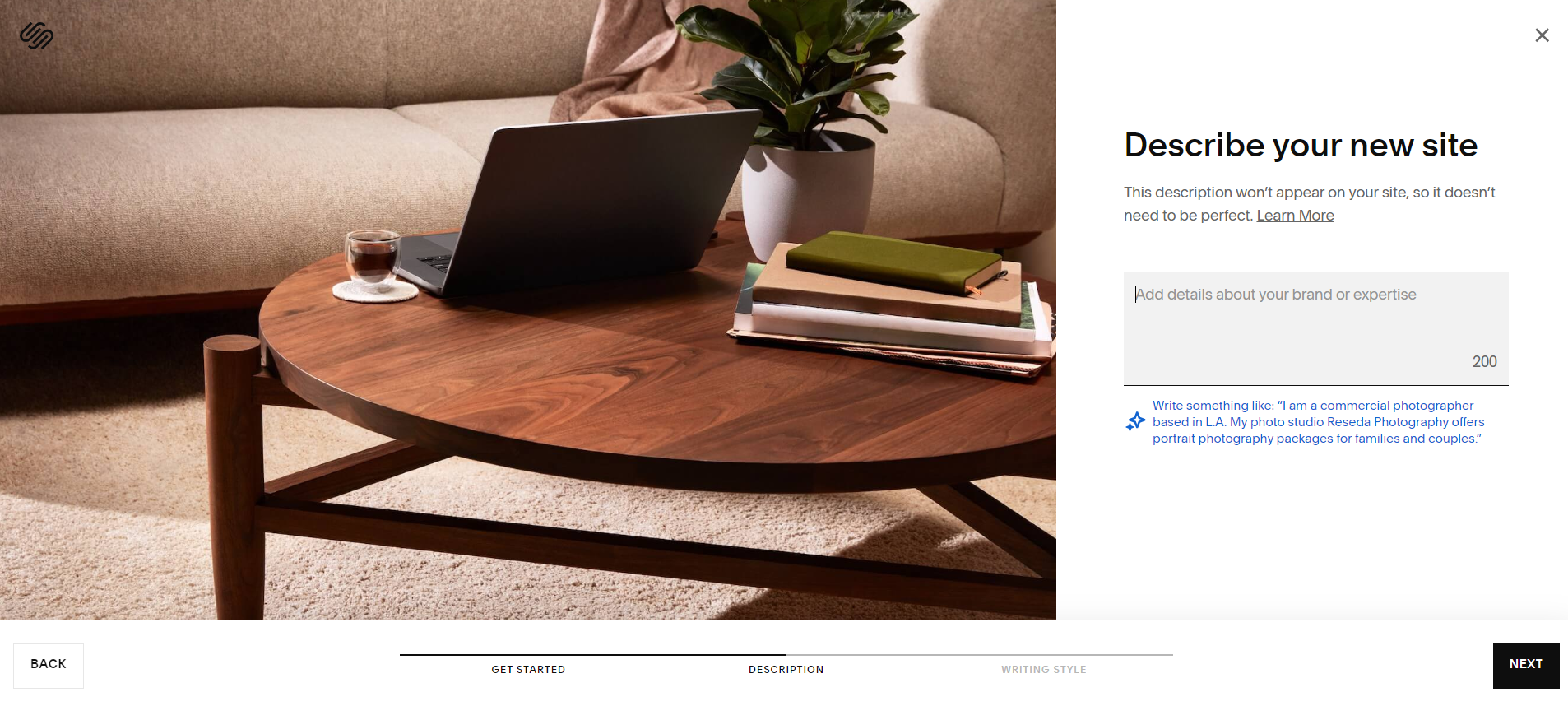
On the other hand, Adobe Portfolio does not have any AI capabilities. It is a website builder specifically designed for creative professionals to showcase their work, but it does not utilize AI to assist in website creation or management.
User Management
User ManagementAssesses the platforms’ capabilities in managing user roles, permissions, and accessibility.Score Components:
- Role Customization (40%): Flexibility in creating and defining user roles and
permissions. - Ease of Management (30%): User interface and tools for managing users.
- Access Control (20%): Effectiveness of access control measures for different user
levels. - Scalability (10%): Ability to manage a growing number of users efficiently.
 7.4
7.4
 3.0
3.0
🏆 Winner: Squarespace
. Squarespace offers a more comprehensive user management system compared to Adobe Portfolio.
- Squarespace allows different numbers of users with editing access depending on the plan. The Personal Plan allows one owner, Business and Commerce Plans permit 2 collaborators with different access levels, and the Enterprise Plan offers unlimited users, each with customizable access privileges, from full administrators to restricted contributors.
- Adobe Portfolio, on the other hand, only allows one user to build and edit a website.
Squarespace User Roles and Access Levels:
| Role | Description | Access Highlights |
|---|---|---|
| Owner | The primary user who created the website and has full access. | Full site access, including billing, site settings, content editing, and member management. |
| Administrator | Users granted nearly full access to manage the site alongside the Owner. | Access to most areas except for some owner-specific settings like ownership transfer. |
| Content Editor | Users focused on adding and managing site content without full site access. | Can add, edit, and delete content on pages, blog posts, and manage comments. |
| Billing | Users who manage the subscription and billing details. | Access to billing information and the ability to update subscription details. |
| Store Manager | Users who manage the ecommerce aspects of the site. | Can manage inventory, fulfill orders, manage customers, and view sales analytics. |
| Custom | A role defined by the site owner or administrators with specific access. | Customizable access as defined by the Owner or Administrators, can vary widely between sites. |
Adobe Portfolio does not provide user roles and access levels as it only allows one user to build and edit a website.
Additional Features

|

|
|
|---|---|---|
|
SSL Certificate |
|
|
|
Custom Domain |
|
|
|
Free Custom Domain Included |
|
|
|
International Domains |
|
|
|
Mobile Responsive |
|
|
|
Page Speed |
|
|
|
Website Builder Mobile App |
|
|
|
Convert a Website To An App |
|
|
|
Website Analytics |
|
|
|
Multilingual Sites |
|
|
|
Multiple Users |
|
|
Squarespace vs Adobe Portfolio: User Feedback
Squarespace is well-liked for its easy-to-use interface and versatile tools, making it ideal for those who aren’t tech-savvy. It offers various features like website creation, SEO, online selling, and more, catering to different users. Customers appreciate its good customer support and visually appealing templates, creating a professional online presence. However, some users find issues with domain transfer/setup, limited customization options, and consider the pricing slightly higher. There are also occasional concerns about customer service and technical limitations like template rigidity and missing features.
Adobe Portfolio, while not available on G2 for reviews, is specifically designed for creative professionals to showcase their work. Its integration with Adobe Creative Cloud and focus on visually appealing, fully responsive websites make it a strong choice for photographers, graphic designers, and artists. However, the lack of detailed user feedback makes it challenging to compare directly with Squarespace in terms of user satisfaction and specific feature performance.
The making of this blog
We followed a clear, step-by-step process to write and research this article.
Squarespace vs Adobe Portfolio: FAQ
Which platform is better for creative professionals, Squarespace or Adobe Portfolio?
Can I sell products on my website with either Squarespace or Adobe Portfolio?
Which platform offers better templates and design functionalities?
Is Squarespace or Adobe Portfolio easier to use?
How do Squarespace and Adobe Portfolio compare in terms of price?
Which platform provides better customer support?
Can I use my own domain with Squarespace and Adobe Portfolio?
Which platform is better for SEO and marketing features?
Are there any AI capabilities in Squarespace or Adobe Portfolio?
Which platform is recommended for users needing multiple user access and management?









